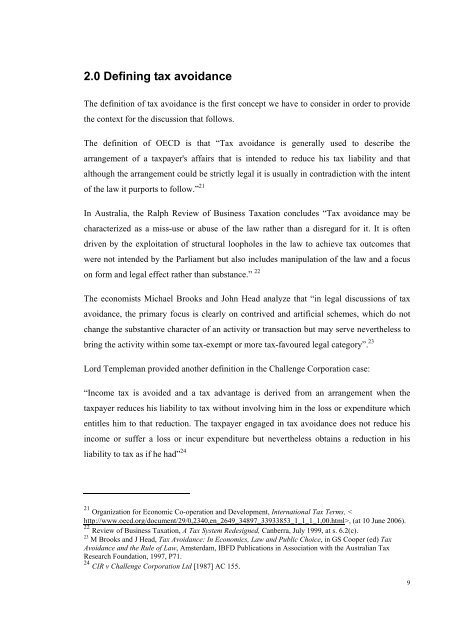Tax Avoidance: Causes and Solutions - Scholarly Commons Home
Tax Avoidance: Causes and Solutions - Scholarly Commons Home
Tax Avoidance: Causes and Solutions - Scholarly Commons Home
You also want an ePaper? Increase the reach of your titles
YUMPU automatically turns print PDFs into web optimized ePapers that Google loves.
2.0 Defining tax avoidance<br />
The definition of tax avoidance is the first concept we have to consider in order to provide<br />
the context for the discussion that follows.<br />
The definition of OECD is that “<strong>Tax</strong> avoidance is generally used to describe the<br />
arrangement of a taxpayer's affairs that is intended to reduce his tax liability <strong>and</strong> that<br />
although the arrangement could be strictly legal it is usually in contradiction with the intent<br />
of the law it purports to follow.” 21<br />
In Australia, the Ralph Review of Business <strong>Tax</strong>ation concludes “<strong>Tax</strong> avoidance may be<br />
characterized as a miss-use or abuse of the law rather than a disregard for it. It is often<br />
driven by the exploitation of structural loopholes in the law to achieve tax outcomes that<br />
were not intended by the Parliament but also includes manipulation of the law <strong>and</strong> a focus<br />
on form <strong>and</strong> legal effect rather than substance.” 22<br />
The economists Michael Brooks <strong>and</strong> John Head analyze that “in legal discussions of tax<br />
avoidance, the primary focus is clearly on contrived <strong>and</strong> artificial schemes, which do not<br />
change the substantive character of an activity or transaction but may serve nevertheless to<br />
bring the activity within some tax-exempt or more tax-favoured legal category”. 23<br />
Lord Templeman provided another definition in the Challenge Corporation case:<br />
“Income tax is avoided <strong>and</strong> a tax advantage is derived from an arrangement when the<br />
taxpayer reduces his liability to tax without involving him in the loss or expenditure which<br />
entitles him to that reduction. The taxpayer engaged in tax avoidance does not reduce his<br />
income or suffer a loss or incur expenditure but nevertheless obtains a reduction in his<br />
liability to tax as if he had” 24<br />
21 Organization for Economic Co-operation <strong>and</strong> Development, International <strong>Tax</strong> Terms, <<br />
http://www.oecd.org/document/29/0,2340,en_2649_34897_33933853_1_1_1_1,00.html>, (at 10 June 2006).<br />
22 Review of Business <strong>Tax</strong>ation, A <strong>Tax</strong> System Redesigned, Canberra, July 1999, at s. 6.2(c).<br />
23 M Brooks <strong>and</strong> J Head, <strong>Tax</strong> <strong>Avoidance</strong>: In Economics, Law <strong>and</strong> Public Choice, in GS Cooper (ed) <strong>Tax</strong><br />
<strong>Avoidance</strong> <strong>and</strong> the Rule of Law, Amsterdam, IBFD Publications in Association with the Australian <strong>Tax</strong><br />
Research Foundation, 1997, P71.<br />
24 CIR v Challenge Corporation Ltd [1987] AC 155.<br />
9

















